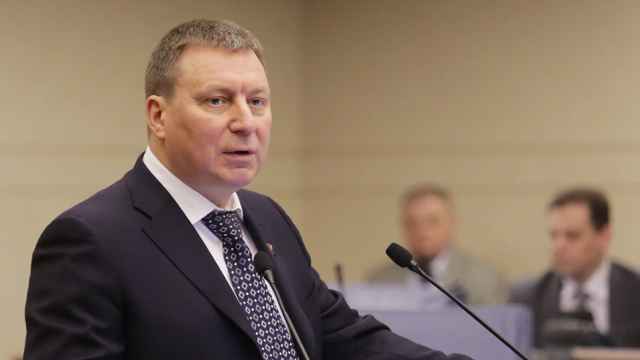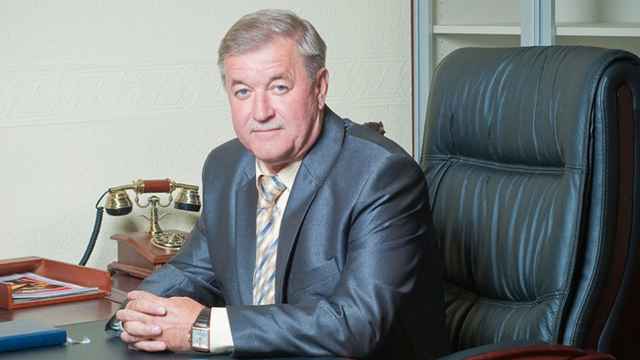Leaked financial papers published by an international group of investigative journalists Sunday implicated several close associates of Russian President Vladimir Putin in allegedly hiding mass amounts of wealth in offshore firms.
The International Consortium of Investigative Journalists said that Russian nationals are “disproportionately represented” in the Pandora Papers, with 14% of the more than 27,000 named companies having Russian beneficiaries and 46 Russian oligarchs found to use offshore companies.
The investigative news website iStories, ICIJ’s partner organization in Russia, delved into the biggest names in Putin’s inner circle implicated in the leak:
Konstantin Ernst
iStories reported that Ernst, the CEO of Russia’s largest state television channel, made billions of rubles by demolishing Soviet-era cinemas in Moscow and building shopping malls in their place through an offshore company.
Ernst, 60, registered an offshore in his name in the British Virgin Islands in 2014, the same year he orchestrated the opening and closing ceremonies of the Sochi Winter Olympics.
In November 2014, Moscow city authorities auctioned off 39 historic Soviet-era cinemas across the capital to a company linked to Ernst’s offshore firm, Moscow Dvorik Ltd. The leaked files also show that Ernst was the beneficiary of a $16.2 million loan — from a Cyprus bank partly owned by Russian state-owned bank VTB — used to fund his stake in the deal.
Ernst denied that the deal was part of his compensation for the Winter Olympics ceremonies and told ICIJ that he did not do anything illegal, because “this is how my parents raised me.”
While he confirmed that he was linked to Moscow Dvorik, Ernst did not explain why he registered a company in the British Virgin Islands; why his partner denied his involvement in this business; or why lawyers demanded that the offshore registrar not send information about shareholders to the British Virgin Islands’ corporate register.
Rostec
The family of Sergei Chemezov, CEO of Russian state defense conglomerate Rostec, hid properties worth 22 billion rubles — including a superyacht and a villa in Spain — in offshore firms, iStories said.
Chemezov, who is under U.S. and EU sanctions, is considered one of Putin’s closest associates and one of the most influential figures at the intersection of Russian business and politics.
According to the investigation, Chemezov's stepdaughter Anastasia Ignatova is the owner of British Virgin Islands-registered offshore Delima Services Ltd., to which the 85-meter, $140 million yacht is registered. She also allegedly owns a hacienda in Spain with an estimated worth of 15 million euros.
The Pandora Papers uncovered a new luxury villa in Spain allegedly owned by Ignatova and Chemezov’s mother-in-law Lyudmila Rukavishnikova via the offshore Penimar Holdings Ltd., among other assets.
Putin’s alleged mistress
Financial records analyzed by ICIJ also found that Putin’s alleged mistress Svetlana Krivonogikh purchased a $4.1 million apartment in Monaco via an offshore company that she became beneficiary of in 2006.
The company was reportedly set up weeks after Krivonogikh gave birth in 2003 to Luiza Vladimirovna Rozova, whom Russian investigative reporters named as Putin’s alleged extramarital daughter last year.
Russian authorities banned Proekt, the investigative outlet that broke the story on Putin’s alleged extramarital daughter, as an “undesirable” organization this summer and placed several of its journalists on their list of “foreign agents.”
Sberbank’s CEO
German Gref, the CEO of state-owned lender Sberbank, established an offshore company in Singapore which was used to store more than $55 million in family assets, according to documents obtained by the Pandora Papers.
The beneficiaries of the family offshore Angelus Trust were Gref’s wife Yana, son Oleg, daughters Maria and Eva, brother Eugene and an individual named Philip Albert Gref, the investigation said.
Transneft
The son-in-law of Nikolai Tokarev, the head of state-owned oil pipeline giant Transneft and a longtime acquaintance and colleague of Putin, became a citizen of Cyprus and set up offshores to manage Transneft’s contractors with contracts worth billions of rubles, iStories said.
Tokarev’s daughter Maya Bolotova and her now ex-husband Andrei Bolotov received passports from EU member Cyprus in 2014, the same year that Transneft was sanctioned by the EU.
Financial records cited by the Pandora Papers show that Bolotov was the beneficiary of a dozen offshore companies. In 2014-2015, Bolotov was the beneficiary of at least three Cypriot companies through firms registered in the British Virgin Islands together with Georgy Bedzhamov, the former co-owner of Vneshprombank who was under investigation for embezzlement of over 100 billion rubles in 2015.
Honorable mentions
Roman Putin, a son of the president’s cousin and the beneficiary of Infinite Capital Corp, registered in 2012 in the Seychelles, and its owner until 2013.
Nikolai Yegorov, one of Putin’s university friends and since 2016 also the owner of Pollux Global Corp registered in the British Virgin Islands. Since 2018, the company has been in the process of liquidation.
Victor Khmarin, another university friend of Putin’s who became a beneficiary of the British Virgin Islands-registered offshore Luciano Services Corp.
A Message from The Moscow Times:
Dear readers,
We are facing unprecedented challenges. Russia's Prosecutor General's Office has designated The Moscow Times as an "undesirable" organization, criminalizing our work and putting our staff at risk of prosecution. This follows our earlier unjust labeling as a "foreign agent."
These actions are direct attempts to silence independent journalism in Russia. The authorities claim our work "discredits the decisions of the Russian leadership." We see things differently: we strive to provide accurate, unbiased reporting on Russia.
We, the journalists of The Moscow Times, refuse to be silenced. But to continue our work, we need your help.
Your support, no matter how small, makes a world of difference. If you can, please support us monthly starting from just $2. It's quick to set up, and every contribution makes a significant impact.
By supporting The Moscow Times, you're defending open, independent journalism in the face of repression. Thank you for standing with us.
Remind me later.






